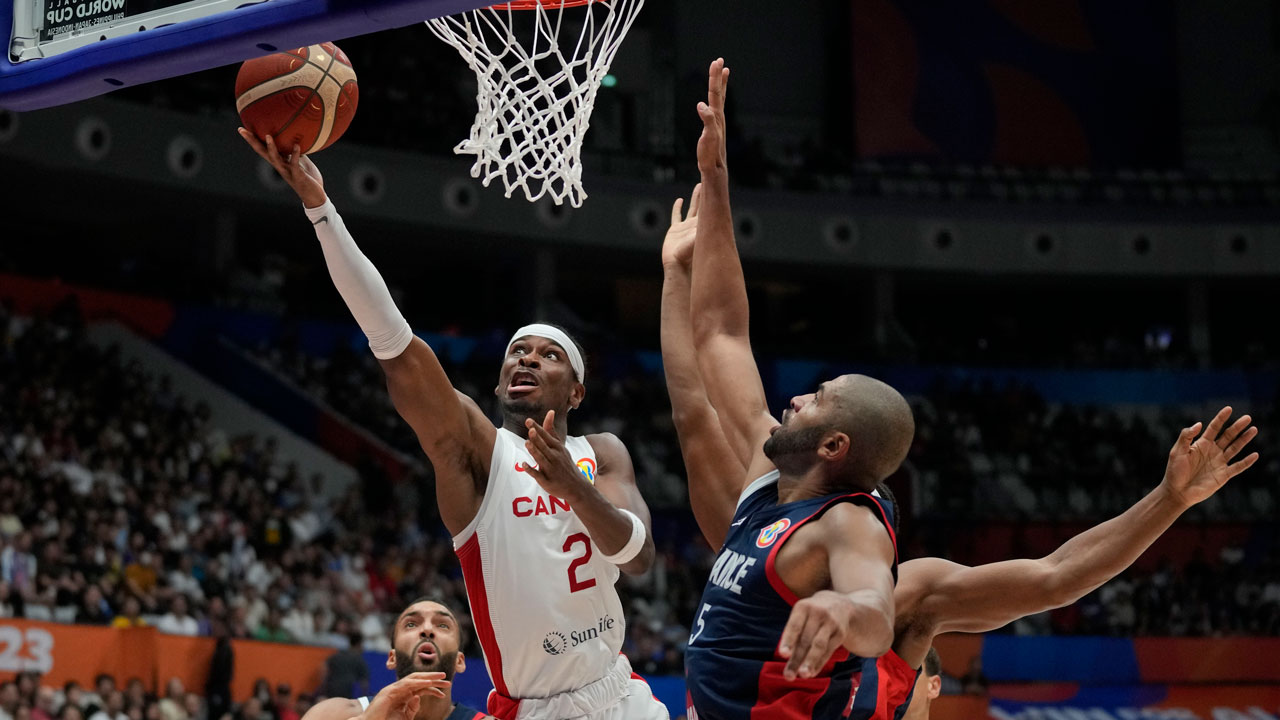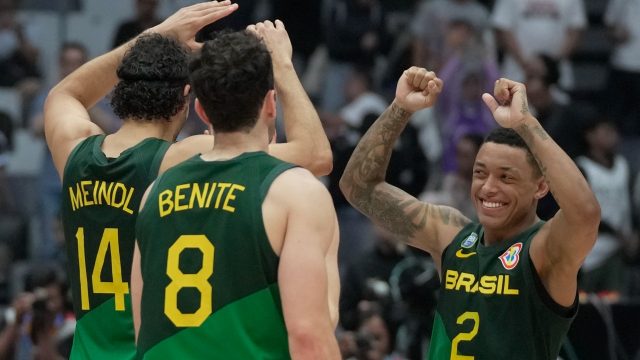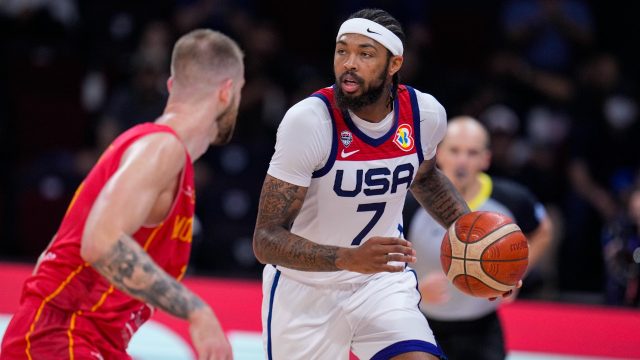
Say what now?
The Canadian men’s national team just coughed up a hairball against Brazil and now has a must-win game Sunday against No.1 ranked Spain in order to keep their hopes alive at the FIBA Basketball World Cup and maintain a chance to directly qualify for the 2024 Olympics?
Okay, okay. Cool, cool. Everything is fine. It’s going to be fine.
Well, maybe not. Let’s be honest about that. Canada losing 69-65 to Brazil Friday morning is a serious body blow for a team with so much riding on using the World Cup to change the story around their program and an early qualification for Paris as a way for a federation with big plans but fluctuating budgets to achieve a new status domestically and abroad.
But at this point what choice does anyone have but to keep telling themselves that ‘hey, things are going to work out, right? Right?’
Hopefully, but the facts are these: Things have gotten a lot more tense after Canada fumbled away a 12-point lead in the space of 3:45 bridging the end of the third quarter and the start of the fourth, allowing Brazil all the way back into a game that seemed ready to be won.
But here we are after Canada went from sitting pretty after blowing through their opposition in the first group stage. Now the best team Canada has ever brought to a global event is staring elimination in the face and putting its Olympic hopes in serious jeopardy.
Beating Brazil didn’t seem like too big an ask. Canada had already proven to be the bully on its side of draw, smashing pre-tournament favourite France, tossing aside darling Latvia.
Brazil? Not only had it lost its highest-profile star, Raul Neto, to a knee injury in the tournament opener, but its path to the second group stage featured wins over 22nd-ranked Iran and 42nd Cote d’Ivoire sandwiched around a blowout loss to Spain. Its best remaining players were gone-but-never-forgotten former Toronto Raptors experiment Bruno Caboclo (who at age 27 finally looked like someone worthy of a first-round draft pick, it should be said) and Santos, the under-sized point guard who had the skills of an NBA player but not the size.
It didn’t seem a question of Canada winning, but how it would win and by how many.
Which is foolish thinking. International basketball and especially Canada’s place in it offers far too many examples of lesser teams slaying giants at the most inopportune times.
Canadian captain Kelly Olynyk has been in the NBA since 2013-14 and in that relatively brief stretch of time he’s been on national teams that have frittered away late-game leads against Venezuela to miss out on an Olympic spot in 2014, been beaten by France in last-chance qualifying in 2016 and been sent home by a Thomas Satoransky buzzer-beater for Czechia when trying to make it to the 2020 Games.
This team, the hope went, would be different. But if they ever needed a reminder of how fragile form is in the international game where it’s often not the quality of your wins but the timing of your losses that matter most, well, they got a full dose of it on Friday.
It wasn’t just Canada that got a taste now that the bottom 16 teams in a relatively bloated 32-team field were relegated to classification games deciding 17-32nd place.
On Friday alone Spain was beaten by undermanned Latvia and Italy had taken out pre-tournament favourite Serbia. Then Puerto Rico, driven by one-time Raptors COVID-19 replacement Tremont Watters, knocked off the Dominican Republic who had won its group powered by NBA star Karl-Anthony Towns.
Form was not holding. It sets up a dramatic Sunday when several games will feature win or go-home implications, but it also sets a team like Canada up for potential heartbreak.
For its part Brazil came out like a fighter knowing its best chance against a superior foe was to clinch, hold and spend as much time as possible trying to exhaust its opponent on the ropes and in the corners.
It was an excellent game plan. Each possession seemed to be taken down to the final seconds of the shot clock. The Brazilians rarely turned it over and when they did look to shoot they made sure the floor was balanced to stifle any hopes Canada had of getting out on transition. As a bonus, the Brazilians were able to use their size and length to gobble up 14 of their own misses to slow the game down even further.
Still, the Canadians kept chipping away. It never felt like they would lose, even if as the game went along it was clear they weren’t going to win easily or in an aesthetically pleasing way.
An 11-0 run heading into half — where Shai Gilgeous-Alexander scored nine of his game-high 23 points — gave Canada a 37-27 lead, which felt huge in a game that was played at a snail’s pace.
The third quarter was more of the same, with possessions challenging the shot clock over and over on each side, but Canada was up 12 with 1:30 left in the third quarter. It seemed like Canada was going to dodge this particular banana peel. But Canada would score just 13 points in the next 13-plus minutes while giving up 28 to Brazil.
There was plenty of blame to go around as Canadian head coach Jordi Fernandez made clear:
“Defensively, I think we were fine, when a team shoots 40 per cent from the field, and 19 per cent from three you should have a chance,” he told the media after the game. “But offensively we were not willing to do anything for each other — space the floor, move the ball, move bodies. When you play like that, it’s really hard to win and today was an example. We had 10 assists, nine turnovers, shot 33 per cent from the field, we didn’t deserve to win. This is good. This is adversity for us. We haven’t faced anything like this, and I believe in our guys. They’re going to work, they care. We’re going to watch film and prepare for Spain.”
The thing is, Spain is going to watch film and be prepared too, and chances are they are going to borrow liberally from Brazil’s game plan.
Secondary scoring around the creative brilliance of Gilgeous-Alexander was always going to be and will remain the question mark around this edition of the national team, which has several capable shooters but lacks the type of marksmen that make opposing defences panic when left open.
While Lu Dort returned from missing a pair of games with an undisclosed injury and showed some offensive punch, finishing with 17 points and three made triples, it was not pretty elsewhere as Nickeil Alexander-Walker and RJ Barrett — who each put up some nice numbers in relatively easy wins in the first group stage — were a combined 2-of-17 from the floor and 2-of-12 from three against Brazil. Dillon Brooks — in foul trouble for long stretches — was 0-of-4 from the field. Olynyk was 2-of-8.
It wasn’t pretty and Spain will certainly be doing everything in its power to force the Canadians who might not feel comfortable shooting to take shots they’ll be uncomfortable shooting.
Plainly put, someone is going to have to break through and breakout, or Canada’s World Cup hopes and Olympic dreams will have to be put on ice for one more summer at least.
The silver lining is that this particular debacle didn’t happen in a do-or-die game. Canada can recover and the momentum it let Brazil snatch away can be recaptured with a strong opening quarter against Spain, and then three more after that.
Pull that off and the stumble against Brazil will be just that, a momentary setback. Come out flat again and the same old storylines will be hanging around for another year and maybe longer.
But the time has come. The narrative won’t change itself. After coming up flat against an opponent it would be expected to beat nine times out of 10, Canada has no choice but to recover and come up with a program-defining win against one of the most accomplished basketball countries in the world.
It’s one way to make a name for yourself, just not the easiest one.







